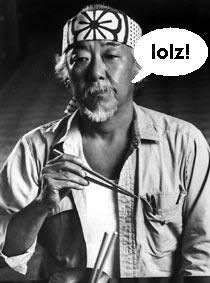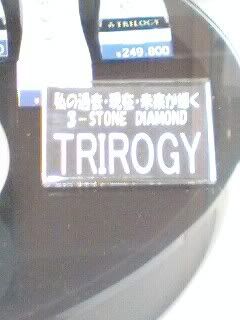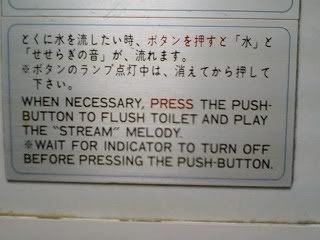Rules Rule
Again, as with most Americans, I tend to follow rules so long as they when the need suits me, and to ignore rules that are pointless or inconvenient. Rules are for other people.
Breaking Rules
When I encounter a rule that is pointless or inconvenient, I do a quick risk assessment to determine the following criteria:
This takes about 2 seconds, and it works because I'm not a (complete) retard.
One thing to remember here is that I (generally) live my life by the "Do unto others" golden rule, so I don't really need to factor in "harm to others" or "possibilities of someone coming after me to kick my ass". I don't take things that aren't mine, and I don't fuck other people over. Of course, there is the odd exception when one someone else puts us in a position where we have no choice but to do something cruel, but like I always say: While we should never revel in cruelty, we must acknowledge that some people need a good dose of it from time to time.
I digress.
The biggest difference between my outlook and most other peoples' outlook is that I acknowledge my own personal accountability if I get caught being bad. If I get dinged for speeding, the cop is not being an asshole, he's doing his job. Some might say the cop is being a prick for pulling me over for going 3 miles over the speedlimit, I say "Well, I was going 3 miles over the speed limit." Stuff like that pisses me off, but I can only be mad at myself.
As I've mentioned in a lot of other posts, many aspects Japanese peoples' viewpoints "in general" is a complete 180 of how I do business, and rules are one of these areas. And when I say anything about "Japanese" in this post, just pretend I wrote "in general" after it. Also, I'm not saying in this post that the Japanese never break rules -- quite the contrary -- but I think their motives and "risk assessment" are based on totally different things, which I might talk about some other time.
Japanese society is very ordered. The Japanese educational system encourages uniformity, and deviation from the norm is punished by shunning and bullying at all levels. While it breeds a very compliant society indeed, it also breeds an incredibly inflexible and uncreative one. I get someone in my office at work almost every day asking for guidance on some trivial matter, and if I have a few minutes or I'm feeling saucey, I get a kick out of asking them what their opinion is on an official matter that they could possibly be held accountable for. Unlike Americans, they won't tell me their opinion or say what a bunch of retards their co-workers are. Instead, they'll maneuver the conversation to try and get me to say what my opinion is, which they'll repeat back to me (expecting me to say "yes") and then leave, so they can tell everyone in their office what the "official" opinion is. This process can sometimes bring people on the verge of tears, depending on how persistent I am in being a pain. A couple weeks ago I kept pushing a woman I work with for her opinion on something and she squatted down on the ground and put her face between her knees. It was a little awkward. (This is an extreme case -- she's a little nutty.)
In Japan, the fact that a rule is a rule is, in and of itself, a reason to enforce it, where in the USA, people who unquestionably enforce rules are ridiculed. In the USA if we encounter a rule that we think is stupid at, say, a store or a gym and we question the worker about it, they will either laugh it off and let you do whatever you want, or they'll say "Look man, I don't make the rules and I don't wanna get fired, so just do it OK?" In Japan, if you question a rule, the person will simply say, "It's a rule", and that's that. If you tell them it's a stupid rule, they'll simply repeat themselves. Here, the value of a rule isn't determined by what the rule is "ruling". The value of the rule lies in the fact that it's a rule, which is good enough.
I'd like to mention that I don't fight rules here, I just comply, because if a rule is written it will be enforced with a last dying breath. I always get a kick out of other roundeye who come here and try and talk their way around rules though, and listen to them talk about how stupid the store clerk or gym attendent was for simply repeating "It's a rule" over and over again.
A good example of how this mentality is both good and bad here in Japan is in how Japanese people deal with cross-walks. Jaywalking in Japan is almost unheard, and if you do it, people you don't know will gasp audibly, and your Japanese friends will "mention it to you."
"I aaah noticed you Jaywalked back there."
"Yeah."
"Not to common over here..."
"Yeah."
That's Japanese for, "Ix-nay on the aywalking-jay, assface."
The result? Fewer people get nailed by oncoming traffic, right?
*but*
When Japanese people cross the street, they don't look both ways, because it doesn't really fit into their reality that a car would come out of nowhere and flatten them. The crosswalk light is green, after all, so the traffic light must be red. Rules are rules.
Another thing that's common is, because of a rule's intrinsic value, the spirit of a rule is totally ignored and it is followed to the letter. Recently, it was decreed that all bicyclists in this area will wear helmets. So now there are a bunch of people riding around with either construction worker hardhats or full-on motorcycle helmets (which is really funny). Rule's aren't interpreted, and if you're not careful directing your Japanese coworkers, pandemonium will ensue. (Japanese people also take this to an extreme by playing dumb, and do things that would get you screamed at in the USA. That doesn't work here though, because after all, you didn't specify the rule well enough, so it's not their fault, it's your fault.)
The reason I thought about this today is because I had a conversation with a Japanese lawyer about name-changing after marriage. Does she have to change her name? Can she keep her name in Japan for Japanese things (it's way easier socially) and be my last name in the states? And what I got was a little bit more like a Monty Python skit. I was getting a kick out of it at first, but in the end it was a frustrating experience. It went something like this:
"Can she keep her last name here but have my last name in the USA?"
"In Japan, one of you must change your name. Those are the rules."
"OK, what if we don't? What if she keeps her last name here but when we go to the states someday she takes on my last name there?"
"Oh I see, you want to change your name to her last name then."
"No, I'm not changing my last name."
"We Japanese change our last name."
"Well this is kind've different, given my status here."
"Ok, so she'll have your last name here in Japan."
"No, no one is going to change their name. She's going to keep her last name here and I'm going to keep mine."
*pause*
"One of you must change your last name."
"What if we don't? What are the penalties? Do they check?"
"...So you will take her last name?"

The whole time he was illustrating his points using circles and boxes on a piece of paper, just for clarity. It's like playing those old text based games, where you're telling it to do something really really simple but, since it's not within the 4 or 5 choices possible, it simply doesn't work. That's how I feel a lot of times in Japan.

As I said before, I don't like telling the people here that the rule they are steadfastly defending is retarded, I get a kick out of reactions I see when I tell them that I will be violating a rule that they themselves are not accountable for enforcing. Many people here can't really wrap their minds around the fact that an unenforced rule is not really a rule.
Obsessive adherence to rules, whether they be social or written, make Japan great, but at the same time cripple it. An insistence to cling to rules or values because it's what "should" be done because everyone else is doing it and because that's how it's always be done. It's one of the dualities that makes living here so interesting and frustrating.


















